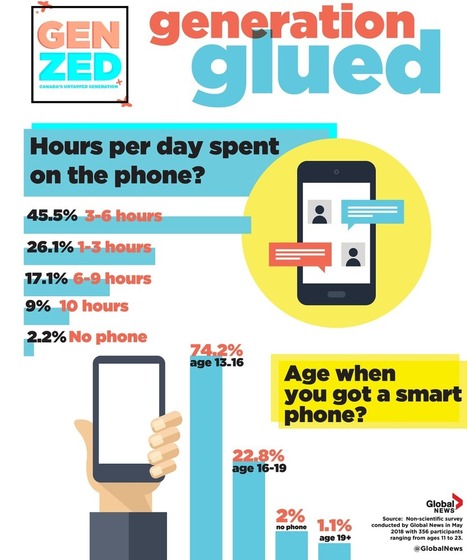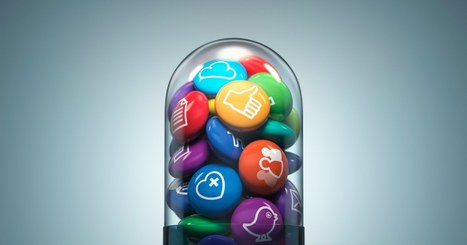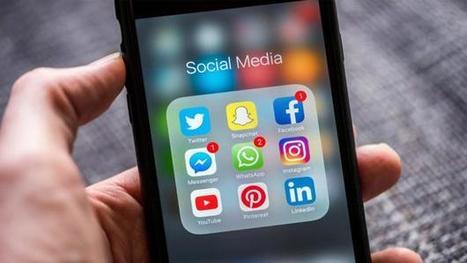 Your new post is loading...
 Your new post is loading...

|
Scooped by
John Evans
|
Look up from this screen right now. Take a look around. On a bus. In a cafe. Even at a stoplight. Chances are, most of the other people in your line of sight are staring at their phones or other devices. And if they don't happen to have one out, it is certainly tucked away in a pocket or bag.
But are we truly addicted to technology? And what about our kids? It's a scary question, and a big one for scientists right now. Still, while the debate rages on, some doctors and technologists are focusing on solutions.
"There is a fairly even split in the scientific community about whether 'tech addiction' is a real thing," says Dr. Michael Bishop. He runs Summerland, which he calls "a summer camp for screen overuse," for teens.

|
Scooped by
John Evans
|
It’s hardly fair to point a finger at the young cohort of 13- to 23-year-olds known as generation Z and accuse them of being “addicted” to their phones. After all, you’d be hard-pressed to find an adult these days who isn’t constantly Googling during a conversation or checking the news during dinner.
Yet, generation Z is often on the receiving end of criticism for the amount of time they spend using technology. Some of this is fair — it’s estimated that they log about 10 hours a day online (an informal Global News survey found that number to be closer to six hours) and a whopping 96 per cent own a smartphone — but this is less an “addiction” than it is a way of life, experts argue.

|
Scooped by
John Evans
|
“People have the power to put this stuff away and they always have,” says Eyal. “But when we preach powerlessness, people believe that.”

|
Scooped by
John Evans
|
Astudy published by the journal Child Development has taken a look at how parents’ use of technology affects their children’s behaviour, and has concluded that “technology-based interruptions in parent–child interactions” – a phenomenon known as “technoference”, which I’m fairly sure was a club night in Stockwell in the 1990s – could be associated with a greater incidence of poor behaviour on the part of children.
Almost half (48%) of the parents in the study admitted to three daily incidents of technoference in their interactions with their kids, and the researchers say that these seem to correlate with young children being more prone to whining, sulking, restlessness, frustration and outbursts of temper. (Coincidentally, these are also the behaviours displayed by adults who are confronted with slow wifi.)
|
Look up from this screen right now. Take a look around. On a bus. In a cafe. Even at a stoplight. Chances are, most of the other people in your line of sight are staring at their phones or other devices. And if they don't happen to have one out, it is certainly tucked away in a pocket or bag.
But are we truly addicted to technology? And what about our kids? It's a scary question, and a big one for scientists right now. Still, while the debate rages on, some doctors and technologists are focusing on solutions.
"There is a fairly even split in the scientific community about whether 'tech addiction' is a real thing," says Dr. Michael Bishop. He runs Summerland, which he calls "a summer camp for screen overuse," for teens.

|
Scooped by
John Evans
|
Look up from this screen right now. Take a look around. On a bus. In a cafe. Even at a stoplight. Chances are, most of the other people in your line of sight are staring at their phones or other devices. And if they don’t happen to have one out, it is certainly tucked away in a pocket or bag.
But are we truly addicted to technology? And what about our kids? It’s a scary question, and a big one for scientists right now. Still, while the debate rages on, some doctors and technologists are focusing on solutions.
“There is a fairly even split in the scientific community about whether ‘tech addiction’ is a real thing,” says Dr. Michael Bishop. He runs Summerland, which he calls “a summer camp for screen overuse,” for teens.

|
Scooped by
John Evans
|
Describing yourself as ‘a social media addict’ doesn’t usually inspire concern from other people. In fact, it’s frequently included in bio descriptions on Twitter and Instagram. Decorate your LinkedIn profile with such a claim and you may even find yourself receiving interest from media and publishing companies searching for a savvy digital native. But imagine if, one day, it’s not an accolade or joke at all – but a psychiatrist’s diagnosis?
Social media addiction has been a much-flouted term lately; maybe it’s because it’s January and users are looking to be more active and spend less time online, or maybe that’s because social media can have a negative impact on our mental well-being. But a growing body of research is seriously considering whether problematic and excessive social media usage could be pathological and, in turn, designated as a mental health disorder.
|




 Your new post is loading...
Your new post is loading...











